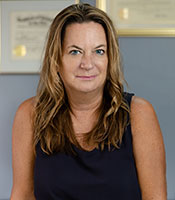2020 Distinguished Alumna
“I like to write. I like to speak. I like to advocate,” says 2020 Distinguished Alumna Award winner Mary Kramer ’85. “That’s always been my deal.”
So when she became an attorney, her practice was always going to veer litigation. And a large part of her business has come to include representing people who have criminal records and are not American citizens.
“I spent a lot of time with non-citizens who had entered into really bad plea deals because they had not been properly advised by their criminal lawyers,” she says.
Soon she found herself speaking on the topic. And, by 2003, that evolved into the first edition of her book, “The Immigration Consequences of Criminal Activity: A Guide to Representing Foreign-Born Defendants.” (The book is now in its 8th edition and Mary has become one of the nation’s leading voices on immigration law in a criminal context. In 2015, the American Immigration Lawyers Association recognized her with their Edith Lowenstein Award for excellence in advancing the practice of immigration law.)
That title is very intentional, “because ‘defendant’ is a term in the criminal context, and I very much promote [the book] to the criminal bar,” she explains. “I teach criminal lawyers and public defenders about immigration consequences because, if you’re representing someone who’s not an American citizen, you really have an ethical obligation to be thinking about the immigration consequences of that plea.”
Her practice also includes complex political asylum cases for people fleeing state-inspired persecution and violence by corrupt foreign governments. “Regardless of Americans’ frustrations with our own government, the Constitution, the rule of law, and a balance of powers reigns in the United States,” she says. “That’s not true of many foreign governments.”
Mary has always felt grateful to the College of Saint Benedict, even to the point of including Saint Ben’s in her prayers. “It truly sounds corny, but it’s true,” she laughs, “because I really felt that was the right environment for me to blossom. Political science and international relations courses with professors like Gary Prevost really sparked that interest for me. I gained a lot of confidence in my writing and my speaking and I learned a lot.”
Some of the most lasting lessons involved Benedictine values like justice and hospitality.
“I do believe very strongly in justice,” she says. “And I believe that we as Americans are so fortunate. Sometimes we forget that we're just so damn blessed to have been born in this country. And we did nothing to deserve that. We were conceived and we were born. People in Syria, people in Honduras … they’re not so fortunate. God put us here. And we have to always, always remember that all human beings are equal and deserve justice.”
Similarly, Mary looks at hospitality as a gift best shared broadly. “When I think of hospitality,” she says, “I think about how I treat a client who comes to my office. I try to welcome them and put them at ease. I introduce them to my staff and say ‘This is your second family until your case is over.’ That, for me, is hospitality.”

